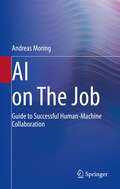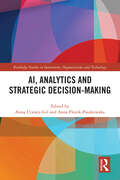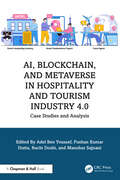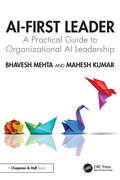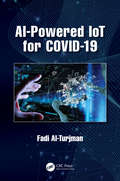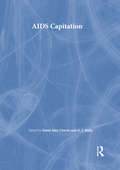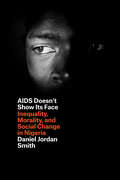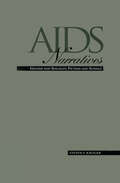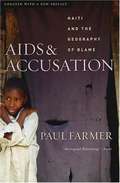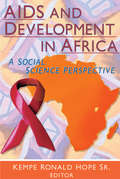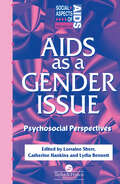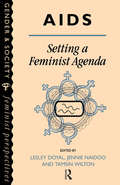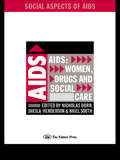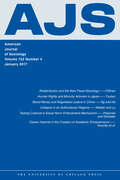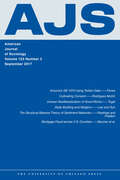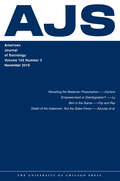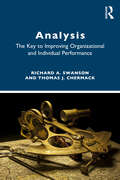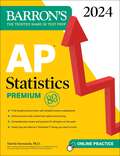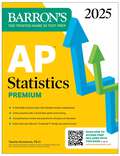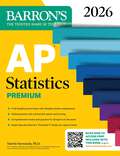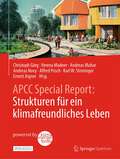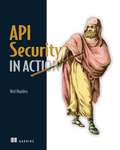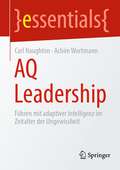- Table View
- List View
AI on The Job: Guide to Successful Human-Machine Collaboration
by Andreas MoringThis book is a practical guide to using artificial intelligence with motivated employees in companies and organizations. You will learn what the prerequisites are for people to look forward to productive collaboration with "intelligent machines". Because this is the only way to leverage the full potential of AI. To this end, you will receive an overview of how and where AI can be used in companies and how to identify the right areas of application for AI in your company. The main issue here is the following: which tasks will be taken over by AI in the future and which should continue to be performed by employees. These decisions change processes and tasks and require practical change management and motivation. In this book, you will learn how to motivate and inspire people for these new tasks, so that the steps towards using AI in the work environment can succeed in the best possible way. About the Author: Prof. Dr. Andreas Moring is Professor of Digital Business, Innovation & AI at the International School of Management. He is founder and director of the JuS.TECH Institute for AI and Sustainability, co-founder of the WeGoFive initiative for productive human-AI cooperation and topic sponsor for human-AI cooperation at the Artificial Intelligence Center ARIC in Hamburg. This book is a translation of the original German 1st edition KI im Job by Andreas Moring, published by Springer-Verlag GmbH Germany, part of Springer Nature in 2021. The translation was done with the help of artificial intelligence (machine translation by the service DeepL.com). A subsequent human revision was done primarily in terms of content, so that the book will read stylistically differently from a conventional translation. Springer Nature works continuously to further the development of tools for the production of books and on the related technologies to support the authors.
AI, Analytics and Strategic Decision-Making (Routledge Studies in Innovation, Organizations and Technology)
by Ujwary-Gil, Edited by Anna Anna Florek-PaszkowskaAI, Analytics and Strategic Decision-Making is an insightful exploration into the transformative power of artificial intelligence and advanced analytics in business and policy contexts. This volume provides a unique blend of theoretical knowledge and practical applications, showcasing how AI and analytics are reshaping decision-making processes across multiple domains.From predicting high-growth firms using Random Forests to leveraging Large Language Models for process mining, this book offers an extensive look at the latest innovations in AI and their strategic implications. It explores diverse topics, including the role of knowledge management in Industry 4.0, AI-powered decision-making tools for individuals, and public policy-making through Internet Public Opinion Analysis. Each chapter provides a nuanced perspective on how AI and analytics tools—ranging from Social Network Analysis to agent-based modeling—can tackle real-world challenges, such as climate change, resource allocation, and productivity enhancement.AI, Analytics and Strategic Decision-Making will inspire entrepreneurs, policymakers, academics, and business strategists to think critically about the power of data-driven insights and AI technologies. This comprehensive resource dives into how innovative tools can foster informed decision-making, drive efficiency, and pave the way for strategic success in an increasingly complex world.
AI, Blockchain, and Metaverse in Hospitality and Tourism Industry 4.0: Case Studies and Analysis
by Pushan Kumar Dutta Adel Ben Youssef Ruchi Doshi Manohar SajnaniThe book offers a critical exploration of the integration of AI, blockchain, and metaverse technology in the hospitality and tourism industry to investigate the potential of these technologies in revolutionizing the industry. This comprehensive work studies, with practical examples, how cutting-edge technologies of Industry 4.0 are transforming luxury industry into a high-touch, hyper-personalized metaverse. It explains how these technologies can be used to improve customer experience and operational efficiency in areas such as guest interaction, supply chain management, payment processing, and virtual stores. The book also discusses the conditions that can promote sustainable development in the hospitality industry using Industry 4.0 technologies. Provides an innovative perspective by blending high-tech trends like AI, blockchain, and metaverse with traditional wellness practices Emphasis on ethical considerations and potential risks associated with the use of these technologies, providing a balanced perspective on their impact Includes case studies and practical examples on how businesses can use AI, blockchain, and the metaverse to improve customer experiences and operational efficiency Explores how the hospitality industry can embrace Industry 4.0 technologies to improve its operations, enhance customer experiences, and contribute to sustainable development Provides a roadmap for companies looking to implement these technologies, highlighting potential benefits and pitfalls of each approach This reference book is for scholars and professionals in computer science who are interested in studying the effect of AI, blockchain, and metaverse in hospitality and tourism industry.
AI-First Leader: A Practical Guide to Organizational AI Leadership
by Mahesh Kumar Bhavesh MehtaAI-First Leader: A Practical Guide to Organizational AI Leadership is a practical guide for executives, technology leaders, and decision- makers seeking to turn artificial intelligence into a strategic advantage. As AI rapidly reshapes how organizations operate and compete, this book provides a clear roadmap from initial awareness to enterprise-wide adoption. It equips leaders with the tools to navigate both the promise and complexity of today’s AI landscape, including machine learning, generative AI, and autonomous systems.Blending technical clarity with strategic insight, the book is anchored in real-world frameworks and brought to life through the fictional yet highly realistic case study of NovaBridge Health, a mid-sized healthcare system navigating the risks and rewards of AI transformation. Through this narrative, readers gain firsthand insights into overcoming early missteps, building trust, aligning AI systems with KPIs, and scaling responsibly in regulated environments. Topics span foundational and advanced concepts, from data governance, model evaluation, and prompt engineering to the deployment of AI agents, resilient infrastructure, and responsible AI practices. Actionable insights, decision frameworks, and sector-specific examples help leaders bridge the gap between innovation and execution.Written for CEOs, CTOs, product managers, and innovation leads, AI-First Leader: A Practical Guide to Organizational AI demystifies AI without diluting its complexity. Whether you’re building your first chatbot, deploying generative search and co-pilots, or shaping guardrails for enterprise-wide use, this book provides the blueprint to lead with AI strategically, responsibly, and at scale.
AI-Powered IoT for COVID-19
by Fadi Al-TurjmanThe Internet of Things (IoT) has made revolutionary advances in the utility grid as we know it. Among these advances, intelligent medical services are gaining much interest. The use of Artificial Intelligence (AI) is increasing day after day in fighting one of the most significant viruses, COVID-19. The purpose of this book is to present the detailed recent exploration of AI and IoT in the COVID-19 pandemic and similar applications. The integrated AI and IoT paradigm is widely used in most medical applications, as well as in sectors that deal with transacting data every day. This book can be used by computer science undergraduate and postgraduate students; researchers and practitioners; and city administrators, policy makers, and government regulators. It presents a smart and up-to-date model for COVID-19 and similar applications. Novel architectural and medical use cases in the smart city project are the core aspects of this book. The wide variety of topics it presents offers readers multiple perspectives on a variety of disciplines. Prof. Dr. Fadi Al-Turjman received his PhD in computer science from Queen’s University, Kingston, Ontario, Canada, in 2011. He is a full professor and research center director at Near East University, Nicosia, Cyprus.
AIDS Capitation
by David A CherinDiscover effective strategies for AIDS healthcare!You’ll definitely want to see what’s documented inside AIDS Capitation if you’re affiliated in any way with current efforts to bolster and improve healthcare policies and procedures for AIDS victims and their families. With this scholarly, up-to-date guidebook, you’ll find that your awareness and knowledge base concerning contemporary AIDS healthcare issues will expand and diversify, giving you a more stable information base from which you can make your own policy changes and civic organization improvements.If you’re a practitioner in HIV/AIDS care, an academic in HIV/AIDS research, or one of the many public officials currently involved in healthcare reform, you’ll find the guidance and proven strategies you need in AIDS Capitation. AIDS Capitation gives you a broad range of information including: descriptive and evaluative aspects of the model of care directions for implementing an innovative model of terminal home care modalities of care in end-stage treatment measurement issues in evaluative research help in measuring outcomes in community-based care funding opportunitiesWithout a doubt, the onset of HIV/AIDS has changed the way we view life. Our schools, government offices, and healthcare venues must change also. AIDS Capitation has everything you need to begin that process of change in your community.
AIDS Doesn't Show Its Face: Inequality, Morality, and Social Change in Nigeria
by Daniel Jordan SmithAIDS and Africa are indelibly linked in popular consciousness, but despite widespread awareness of the epidemic, much of the story remains hidden beneath a superficial focus on condoms, sex workers, and antiretrovirals. Africa gets lost in this equation, Daniel Jordan Smith argues, transformed into a mere vehicle to explain AIDS, and in AIDS Doesn’t Show Its Face, he offers a powerful reversal, using AIDS as a lens through which to view Africa. Drawing on twenty years of fieldwork in Nigeria, Smith tells a story of dramatic social changes, ones implicated in the same inequalities that also factor into local perceptions about AIDS—inequalities of gender, generation, and social class. Nigerians, he shows, view both social inequality and the presence of AIDS in moral terms, as kinds of ethical failure. Mixing ethnographies that describe everyday life with pointed analyses of public health interventions, he demonstrates just how powerful these paired anxieties—medical and social—are, and how the world might better alleviate them through a more sensitive understanding of their relationship.
AIDS Narratives: Gender and Sexuality, Fiction and Science (Gender and Genre in Literature #7)
by Steven F. KrugerFirst published in 1996. Routledge is an imprint of Taylor & Francis, an informa company.
AIDS and Accusation: Haiti and the Geography of Blame
by Paul FarmerExposes the racism inherent in the now-discredited supposition that AIDS came to the US via Haiti. (It was the other way around.) Award-winning author Paul Farmer, now working in Rwanda, updates this 1992 study with a new preface.
AIDS and Development in Africa: A Social Science Perspective (Haworth Psychosocial Issues Of Hiv/aids Ser.)
by R Dennis Shelby Kempe Ronald Hope, SrAIDS and Development in Africa: A Social Science Perspective is the first book-length treatment of both the impact of AIDS in Africa and an assessment of intervention strategies in varying cultural situations. Developed from revised selected papers from the nineteenth Southern African Universities Social Science Conference, AIDS and Development in Africa will be of interest to counselors, medical and development practitioners, Africanists, and AIDS researchers. From this book, you will find wide analytical coverage of the issues and country case studies related to the contributory factors and development impact of the HIV/AIDS pandemic in Africa. You will also explore the ability of countries to willingly promote and cope with the pandemic in the context of their different economic circumstances.Specifically in AIDS and Development in Africa, you will read about: socioeconomic context of AIDS social scientific explanations of the AIDS pandemic in Africa HIV/AIDS and the status of women in Botswana and Swaziland sexual abuse and HIV/AIDS law and HIV/AIDS orphans of the AIDS pandemic media and the African context of social construction human resource development and training in relation to HIV/AIDS in ZambiaAIDS and Development in Africa uses a multidisciplinary social science perspective in case studies of such countries as Botswana, Swaziland, Zimbabwe, South Africa, Malawi, and Zambia to reveal contributory factors and the developmental impact of HIV/AIDS in Africa. This book demonstrates the human consequences of AIDS and the efforts being made by governments, individuals, families, villages, communities, and national government organizations to respond to the pandemic. For example, you will learn about information campaigns and peer education approaches that are successfully increasing transmission awareness and condom use. You will read beyond the usual analysis of demographics and receive much more substantial assessments and analyses of the burden on people, economies, and health care systems of the African countries. AIDS and Development in Africa is indispensable to anyone who is involved with HIV/AIDS prevention/intervention in Africa. This comprehensive book provides you with essential and up-to-date research on the many issues surrounding Africa’s HIV/AIDS pandemic.
AIDS as a Gender Issue: Psychosocial Perspectives (Social Aspects of AIDS)
by Lydia Bennett Catherine Hankins Lorraine SherrThis international collection examines a wide range of psycho-social aspects of AIDS and HIV infection, including prevention, education, healthcare and policy in terms of gender challenges.
AIDS: Setting A Feminist Agenda (Gender And Society Ser.)
by Jennie Naidoo Lesley Doyal Tamsin WiltonAIDS: Setting a Feminist Agenda" presents an overview of the important issues raised for feminist theory and practice by the HIV/AIDS epidemic, and outlines the direction in which feminist debates about the subject are developing. It makes essential links between feminism and HIV/AIDS work, and not only demonstrates that AIDS is a feminist issue, but also suggests areas where feminism is long overdue. The essays discuss medical issues; the specific social and political impact of HIV/AIDS on the lives of women of colour, lesbians, injecting drug users and prostitute women; And Current Health Educational And Health Promotional Practice As It relates to women.; The volume is theoretical and practical - suggesting theoretical models for understanding and challenging the social factors which are conducive to the spread of HIV among women and among men, as well as offering models of good practice for working with and for women.
AIDS: Women, Drugs And Social Care (Social Aspects of AIDS #Vol. 1)
by Nicholas Dorn Sheila Henderson Nigel SouthExamines the circumstances, experiences and needs of HIV-positive people in Britain and Ireland, and particularly focuses on female drug-users and ex drug-users.
AJS vol 122 num 5
by The University of Chicago PressThis is volume 122 issue 5 of American Journal of Sociology. American Journal of Sociology (AJS) presents pathbreaking work from all areas of sociology, with an emphasis on theory building and innovative methods. AJS strives to speak to the general sociology reader and is open to contributions from across the social sciences—sociology, political science, economics, history, anthropology, and statistics—that seriously engage the sociological literature to forge new ways of understanding the social. AJS offers a substantial book review section that identifies the most salient work of both emerging and enduring scholars of social science. Commissioned review essays appear occasionally, offering readers a comparative, in-depth examination of prominent titles.
AJS vol 123 num 2
by The University of Chicago PressThis is volume 123 issue 2 of American Journal of Sociology. American Journal of Sociology (AJS) presents pathbreaking work from all areas of sociology, with an emphasis on theory building and innovative methods. AJS strives to speak to the general sociology reader and is open to contributions from across the social sciences—sociology, political science, economics, history, anthropology, and statistics—that seriously engage the sociological literature to forge new ways of understanding the social. AJS offers a substantial book review section that identifies the most salient work of both emerging and enduring scholars of social science. Commissioned review essays appear occasionally, offering readers a comparative, in-depth examination of prominent titles.
AJS vol 125 num 3
by The University of Chicago PressThis is volume 125 issue 3 of American Journal of Sociology. American Journal of Sociology (AJS) presents pathbreaking work from all areas of sociology, with an emphasis on theory building and innovative methods. AJS strives to speak to the general sociology reader and is open to contributions from across the social sciences—sociology, political science, economics, history, anthropology, and statistics—that seriously engage the sociological literature to forge new ways of understanding the social. AJS offers a substantial book review section that identifies the most salient work of both emerging and enduring scholars of social science. Commissioned review essays appear occasionally, offering readers a comparative, in-depth examination of prominent titles.
ANALYSIS: The Key to Improving Organization and Individual Performance
by Richard A. Swanson Thomas J. ChermackWith the volatile nature of today’s workplaces, analysis tools are more valuable than ever: this book provides those tools to capture human expertise before it leaves the organization.The concepts of analysis may be timeless, but recent years have seen massive changes in terms of organizational structures, work systems, and worker requirements, such as remote working and increased employee turnover. This book covers the theory and concepts behind performance improvement, and then turns to the real-world work of performance diagnosis, process improvement, and task documentation, introducing cross-functional task analysis, which recognizes the changing nature of work as more of today’s tasks are extensive and require collaboration across jobs. Each chapter can stand alone if organizations need to focus on a particular area, and includes examples that reflect contemporary work, from job descriptions to task inventories and specific task analyses.One of the only texts providing the tools and processes necessary to analyze workplace performance, document human expertise, and develop training materials, this book is intended for managers, executives, students, and any workplace or organization development professional interested in human expertise and how to manage it.
AP Statistics Flashcards, Fifth Edition: Up-to-Date Practice (Barron's AP Prep)
by Martin Sternstein Ph.D.Be prepared for exam day with Barron&’s. Trusted content from AP experts!Barron&’s AP Statistics Flashcards includes 500 up-to-date practice questions.Written by Experienced EducatorsLearn from Barron&’s--all content is written and reviewed by AP expertsBuild your understanding with practice tailored to the most recent examBe Confident on Exam DaySharpen your test-taking skills with 400 multiple-choice and 100 free-response practice questions covering all units of the AP Statistics examDeepen your understanding by reviewing the detailed answer explanations that accompany all questionsCheck out Barron&’s AP Statistics Premium for even more review, full-length practice tests, and access to Barron&’s Online Learning Hub for a timed test option and scoring.
AP Statistics Flashcards, Fourth Edition: Up-to-Date Practice (Barron's Test Prep)
by Martin Sternstein Ph.D.Be prepared for exam day with Barron&’s. Trusted content from AP experts! Barron&’s AP Statistics Flashcards provides 500 up-to-date practice questions anywhere, anytime with this digital format. Written by Experienced Educators Learn from Barron&’s--all content is written and reviewed by AP experts Build your understanding with practice tailored to the most recent examBe Confident on Exam DaySharpen your test-taking skills with 400 multiple-choice and 100 free-response practice questions covering all units of the AP Statistics examDeepen your understanding by reviewing the detailed answer explanations that accompany all questionsDigital flashcard featuresAccess anywhere: study on all devices, including mobile--available online and offlineFlip functionality: a simple click flips cards from front to backRandom select: review cards in a random order rather than sequentiallyCheck out Barron&’s AP Statistics Premium for even more review, full-length practice tests, and access to Barron&’s Online Learning Hub for a timed test option and scoring.
AP Statistics Premium, 2024: 9 Practice Tests + Comprehensive Review + Online Practice (Barron's AP)
by Martin Sternstein Ph.D.Be prepared for exam day with Barron&’s. Trusted content from AP experts!Barron&’s AP Statistics Premium, 2024 includes in-depth content review and online practice. It&’s the only book you&’ll need to be prepared for exam day.Written by Experienced EducatorsLearn from Barron&’s--all content is written and reviewed by AP expertsBuild your understanding with comprehensive review tailored to the most recent examGet a leg up with tips, strategies, and study advice for exam day--it&’s like having a trusted tutor by your sideBe Confident on Exam DaySharpen your test-taking skills with 9 full-length practice tests--6 in the book, including a diagnostic test to target your studying, and 3 more onlineStrengthen your knowledge with in-depth review covering all Units on the AP Statistics ExamReinforce your learning with numerous practice quizzes throughout the bookOnline PracticeContinue your practice with 3 full-length practice tests on Barron&’s Online Learning HubSimulate the exam experience with a timed test optionDeepen your understanding with detailed answer explanations and expert adviceGain confidence with scoring to check your learning progress
AP Statistics Premium, 2025: Prep Book With 9 Practice Tests + Comprehensive Review + Online Practice (Barron's AP Prep)
by Martin Sternstein Ph.D.Be prepared for exam day with Barron&’s. Trusted content from AP experts!Barron&’s AP Statistics Premium, 2025 includes in‑depth content review and online practice. It&’s the only book you&’ll need to be prepared for exam day.Written by Experienced EducatorsLearn from Barron&’s‑‑all content is written and reviewed by AP expertsBuild your understanding with comprehensive review tailored to the most recent examGet a leg up with tips, strategies, and study advice for exam day‑‑it&’s like having a trusted tutor by your sideBe Confident on Exam DaySharpen your test‑taking skills with 9 full‑length practice tests‑‑6 in the book, including a diagnostic test to target your studying, and 3 more online–plus detailed answer explanations for all questionsStrengthen your knowledge with in‑depth review, including hundreds of examples and worked out solutions, covering all Units on the AP Statistics ExamReinforce your learning with 29 quizzes throughout the book that feature hundreds of multiple-choice and free-response practice questionsBoost your confidence by reviewing key reminders and pitfalls to avoid on test day, advice on selecting the appropriate inference procedure, guidance on calculator usage, and much moreOnline PracticeContinue your practice with 3 full‑length practice tests on Barron&’s Online Learning HubSimulate the exam experience with a timed test optionDeepen your understanding with detailed answer explanations and expert adviceGain confidence with scoring to check your learning progress
AP Statistics Premium, 2026: Prep Book with 9 Practice Tests + Comprehensive Review + Online Practice (Barron's AP Prep)
by Martin Sternstein Ph.D. Barron's Educational SeriesBe prepared for exam day with Barron&’s. Trusted content from AP experts!Barron&’s AP Statistics Premium, 2026 includes in‑depth content review and online practice. It&’s the only book you&’ll need to be prepared for exam day. This book is intended both as a topical review during the year and as a final review in the weeks before the AP exam.Written by Experienced Educators Learn from Barron&’s‑‑all content is written and reviewed by AP experts Build your understanding with comprehensive review tailored to the most recent exam Get a leg up with tips, strategies, and study advice for exam day‑‑it&’s like having a trusted tutor by your side Be Confident on Exam Day Sharpen your test‑taking skills with 9 full‑length practice tests‑‑5 in the book, including a diagnostic test to target your studying, and 4 more online–plus detailed answer explanations for all questions Strengthen your knowledge with in‑depth review, including hundreds of examples and worked out solutions, covering all Units on the AP Statistics Exam Reinforce your learning with 29 quizzes throughout the book that feature hundreds of multiple-choice and free-response practice questions Boost your confidence by reviewing key reminders and pitfalls to avoid on test day, advice on selecting the appropriate inference procedure, guidance on calculator usage, and much more Online Practice Continue your practice with 4 full‑length practice tests on Barron&’s Online Learning Hub Simulate the exam experience with a timed test option Deepen your understanding with detailed answer explanations and expert advice Gain confidence with scoring to check your learning progress Publisher's Note: Products purchased from 3rd party sellers are not guaranteed by the publisher for quality, authenticity, or access to any online entities included with the product.
APCC Special Report: Strukturen für ein klimafreundliches Leben
by Karl W. Steininger Alfred Posch Andreas Novy Christoph Görg Verena Madner Andreas Muhar Ernest AignerDie Klimakrise betrifft uns alle - Doch wie kann ein klimafreundliches Leben für alle erreicht werden? Zahlreiche wissenschaftliche Sachstandsberichte bestätigen schon lange den umfassenden Handlungsbedarf, um die Klimaziele zu erreichen. Dieser betrifft alle Lebensbereiche: von Arbeit und Pflege über Wohnen bis zu Mobilität, Ernährung und Freizeit. Doch wie verwirklicht man solch eine Transformation? Der Bericht unterstreicht, dass die Möglichkeiten, klimafreundlich zu leben, wesentlich durch Strukturen vorgegeben ist. Die vorherrschenden Appelle an das verantwortungsbewusste individuelle Verhalten Einzelner und Aufrufe zu nachhaltigem Konsum werden in ihren Wirkungen überschätzt. Entsprechend ist die Kernbotschaft des Berichts, die gemeinsame Gestaltung von Strukturen für ein klimafreundliches Leben ins Zentrum der Klimapolitik zu stellen. Daher gibt das Buch Antworten auf folgende Fragen: Wie können Rahmenbedingungen so gestaltet werden, dass ein klimafreundliches Leben für jeden selbstverständlich oder zumindest erleichtert wird?Welchen Beitrag können die verschiedenen gesellschaftlichen Akteure leisten? Was bedeutet dies für Recht und Governance, die Wirtschaft, Globalisierung und das Finanzsystem?Können Medien einen Beitrag dazu leisten? Welche Rolle haben Ungleichheit, soziale Sicherung und Raumplanung und welche Infrastrukturen sind notwendig? Dieses Open Access Buch ist das Ergebnis eines umfassenden wissenschaftlichen Erstellungsprozesses, der sich an der Arbeitsweise des Weltklimarates IPCC orientierte: mehr als 80 Autor_innen analysierten die aktuelle wissenschaftliche Literatur zur Gestaltung von Strukturen für ein klimafreundliches Leben. Dazu wurden über 2000 Literaturquellen ausgewertet. Zur Absicherung der Qualität wurden die Ergebnisse der Autor_innen von in etwa 180 Expert_innen und circa 100 Stakeholdern in mehreren Runden begutachtet. Der innovative Zugang und die bisher wenig aufgegriffenen Themenfelder machen das Buch zu einem Standardwerk für die Klimaforschung im deutschsprachigen Raum.
API Security in Action
by Neil MaddenAPI Security in Action teaches you how to create secure APIs for any situation. By following this hands-on guide you&’ll build a social network API while mastering techniques for flexible multi-user security, cloud key management, and lightweight cryptography.Summary A web API is an efficient way to communicate with an application or service. However, this convenience opens your systems to new security risks. API Security in Action gives you the skills to build strong, safe APIs you can confidently expose to the world. Inside, you&’ll learn to construct secure and scalable REST APIs, deliver machine-to-machine interaction in a microservices architecture, and provide protection in resource-constrained IoT (Internet of Things) environments. Purchase of the print book includes a free eBook in PDF, Kindle, and ePub formats from Manning Publications. About the technology APIs control data sharing in every service, server, data store, and web client. Modern data-centric designs—including microservices and cloud-native applications—demand a comprehensive, multi-layered approach to security for both private and public-facing APIs. About the book API Security in Action teaches you how to create secure APIs for any situation. By following this hands-on guide you&’ll build a social network API while mastering techniques for flexible multi-user security, cloud key management, and lightweight cryptography. When you&’re done, you&’ll be able to create APIs that stand up to complex threat models and hostile environments. What's inside Authentication Authorization Audit logging Rate limiting Encryption About the reader For developers with experience building RESTful APIs. Examples are in Java. About the author Neil Madden has in-depth knowledge of applied cryptography, application security, and current API security technologies. He holds a Ph.D. in Computer Science. Table of Contents PART 1 - FOUNDATIONS 1 What is API security? 2 Secure API development 3 Securing the Natter API PART 2 - TOKEN-BASED AUTHENTICATION 4 Session cookie authentication 5 Modern token-based authentication 6 Self-contained tokens and JWTs PART 3 - AUTHORIZATION 7 OAuth2 and OpenID Connect 8 Identity-based access control 9 Capability-based security and macaroons PART 4 - MICROSERVICE APIs IN KUBERNETES 10 Microservice APIs in Kubernetes 11 Securing service-to-service APIs PART 5 - APIs FOR THE INTERNET OF THINGS 12 Securing IoT communications 13 Securing IoT APIs
AQ Leadership: Führen mit adaptiver Intelligenz im Zeitalter der Ungewissheit (essentials)
by Carl Naughton Achim WortmannAQ fördert das Führen. Dies und was diese Förderung ausmacht, zeigen verschiedene Studien. AQ ist die Bezeichnung für ein Bündel von Fähigkeiten und Fertigkeiten von Mitarbeitenden, deren Leistungen auch in unsicheren und komplexen Situationen konstant und stark sind. Auch wenn AQ nicht in einem wörtlichen Gegensatz zum IQ steht, so kann AQ doch als eine sehr treffende Interpretation der für das 21. Jahrhundert relevanten mentalen Fähigkeiten angesehen werden. AQ hat fünf Dimensionen, deren Wirkweise in den Kapiteln mit direkten Tools und Tipps verknüpft werden, um AQ Leadership von der Forschung in die Praxis zu transferieren.
